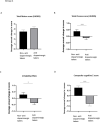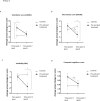Antidopaminergic treatment is associated with reduced chorea and irritability but impaired cognition in Huntington's disease (Enroll-HD)
- PMID: 32229581
- PMCID: PMC7279191
- DOI: 10.1136/jnnp-2019-322038
Antidopaminergic treatment is associated with reduced chorea and irritability but impaired cognition in Huntington's disease (Enroll-HD)
Abstract
Objectives: Alterations in dopamine neurotransmission underlie some of the clinical features of Huntington's disease (HD) and as such are a target for therapeutic intervention, especially for the treatment of chorea and some behavioural problems. However, justification for such an intervention is mainly based on case reports and small open label studies and the effects these drugs have on cognition in HD remain unclear.
Methods: In this study, we used the Enroll-HD observational database to assess the effects of antidopaminergic medication on motor, psychiatric and cognitive decline, over a 3-year period. We first looked at the annual rate of decline of a group of HD patients taking antidopaminergic medication (n=466) compared with an untreated matched group (n=466). The groups were matched on specified clinical variables using propensity score matching. Next, we studied a separate group of HD patients who were prescribed such medications part way through the study (n=90) and compared their rate of change before and after the drugs were introduced and compared this to a matched control group.
Results: We found that HD patients taking antidopaminergic medication had a slower progression in chorea and irritability compared with those not taking such medications. However, this same group of patients also displayed significantly greater rate of decline in a range of cognitive tasks.
Conclusion: In conclusion we found that antidopaminergic treatment is associated with improvements in the choreic movements and irritability of HD but worsens cognition. However, further research is required to prospectively investigate this and whether these are causally linked, ideally in a double-blind placebo-controlled trial.
© Author(s) (or their employer(s)) 2020. Re-use permitted under CC BY-NC. No commercial re-use. See rights and permissions. Published by BMJ.
Conflict of interest statement
Competing interests: None declared.
Figures


References
-
- Craufurd D, Thompson JC, Snowden JS. Behavioral changes in Huntington disease. Neuropsychiatry Neuropsychol Behav Neurol 2001;14:219–26. - PubMed
Publication types
MeSH terms
Substances
Grants and funding
LinkOut - more resources
Full Text Sources
Medical
